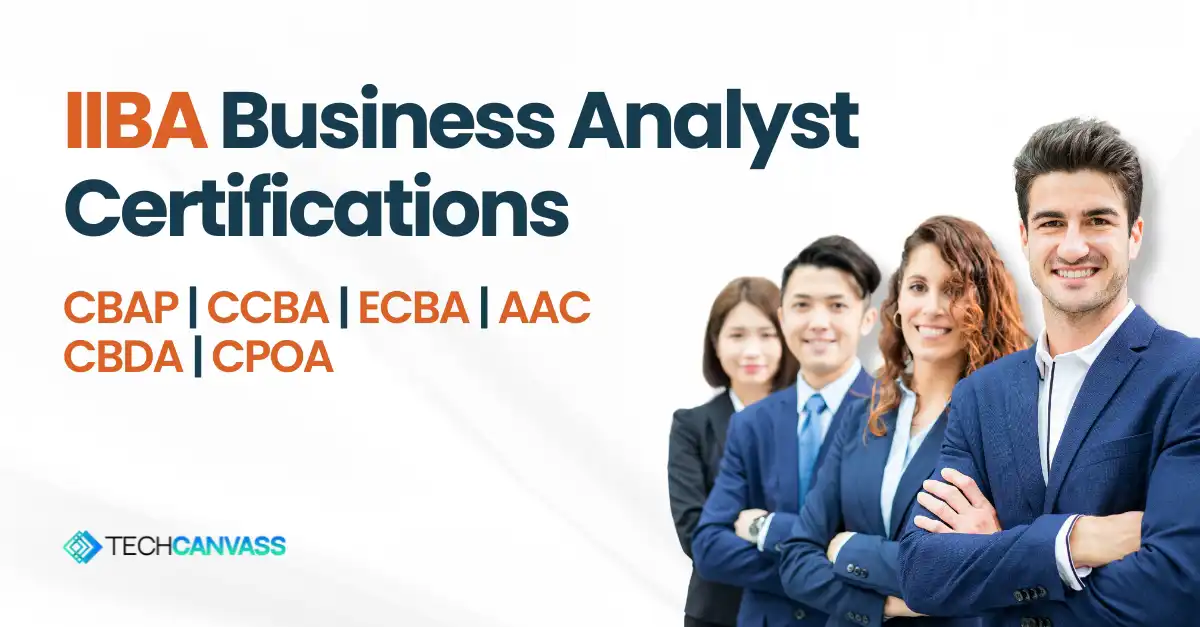Which are the top IIBA Business Analyst Certifications? IIIBA Canada offers a wide range for certifications for business analysts. In this article, we will provide all the details related to these certifications.
Globally recognized, IIBA certificates validate your abilities and understanding of various key aspects of the profession, suitable for all career stages.
List of IIBA Business Analyst Certifications
Six of the top IIBA Certifications for Business Analysts are:
- Certified Business Analysis Professional (CBAP)
- Certification of Capability in Business Analysis (CCBA)
- Entry Certificate in Business Analysis (ECBA)
- Agile Analysis Certification (AAC)
- Certification in Business Data Analytics (CBDA)
- Certified Product Owner and Analysis (CPOA)
CBAP Certification
The CBAP designation is a professional certification recognizing individuals with significant experience in Business Analysis. CBAP recipients are esteemed as the leading and senior members within the BA community, showcasing their expertise and seniority in the field.
Eligibility:
- Accumulate a minimum of 7,500 hours of Business Analysis work experience within the past 10 years.
- Ensure a minimum of 900 hours is completed in 4 out of the 6 BABOK® Guide Knowledge Areas.
- Complete a minimum of 35 hours of Professional Development in the last 4 years.
- Provide two professional references.
- Agree to the Code of Conduct.
- Accept the Terms and Conditions.
- Successfully pass the exam.
Fees:
| Head | Application fee | Exam Fee | Exam Rewrite Fee |
| Member | $145 | $350 | $295 |
| Non-Member | $145 | $505 | $450 |
| Corporate Member | $145 | $305 | N/A |
Who can go for CBAP?
- For business analysts with a minimum of 5 years of experience in the last 10 years.
- To grow and prove competence as a senior business analyst.
If you want to be CBAP Certified visit this page – CBAP® Certification Training
CCBA Certification
The CCBA certification is a professional credential by IIBA. It’s for business analysts with 2 to 3 years of experience, showing they can handle bigger and more complex projects. Getting CCBA certified recognizes their skills in business analysis and readiness for tougher challenges in the field.
Eligibility:
- Accumulate a minimum of 3,750 hours of Business Analysis work experience within the past 7 years.
- Fulfill a minimum of 900 hours in each of 2 out of the 6 BABOK® Guide Knowledge Areas OR achieve a minimum of 500 hours in each of 4 out of the 6 BABOK® Guide Knowledge Areas.
- Complete a minimum of 21 hours of Professional Development in the last 4 years.
- Provide professional references.
- Agree to adhere to the Code of Conduct.
- Accept the Terms and Conditions.
- Successfully pass the exam.
Fees:
| Head | Application fee | Exam Fee | Exam Rewrite Fee |
| Member | $145 | $250 | $195 |
| Non-Member | $145 | $405 | $350 |
| Corporate Member | $145 | $205 | N/A |
Who can go for CCBA?
- When you have 2 to 3 years of experience as a business analysis practitioner.
- To demonstrate competence in handling larger and more complex project responsibilities.
If you want to be CCBA Certified visit this page – CCBA Certification Training
ECBA Certification
IIBA ECBA is the entry certificate in Business Analysis and is awarded by IIBA, Canada. This certification checks basic knowledge and skills, helping individuals start their careers in business analysis.
Eligibility:
- Register an account with IIBA (if not already a member)
- Agree to the Code of Conduct
- Accept the Terms and Conditions
Fees:
| Head | Exam Fee | Exam Rewrite Fee |
| Member | $195 | $95 |
| Non-Member | $350 | $250 |
| Corporate Member | $150 | N/A |
Who can go for ECBA?
- If you are a non-IT professional aspiring to become a business analyst.
- If you are a developer or tester aiming to transition into a business analyst role.
- If you are a fresher without any experience.
If you want to be ECBA Certified visit this page – ECBA Certification Training
Agile Analysis Certification
The IIBA Agile Analysis (IIBA-AAC) Certification is a new competency-based certification that meets the needs and demands of both the agile and analyst communities. It encourages collaboration and supports the transformation of project delivery by emphasizing agile principles.
Eligibility:
No specific eligibility criteria, but IIBA recommends 2-3 years of experience in Agile business analysis.
Fees:
| Head | Exam Fee | Exam Rewrite Fee |
| Member | $250 | $195 |
| Non-Member | $400 | $350 |
| Corporate Member | $225 | N/A |
Who can go for AAC?
If working in Agile projects or interested in entering Agile projects.
If you want to be AAC Certified visit this page – IIBA Agile Analysis Certification Training
CBDA Certification
The Certification in Business Data Analytics (IIBA-CBDA) acknowledges your skill in successfully performing analysis tasks that contribute to business analytics initiatives. It demonstrates your competence in executing analytical work to support business objectives.
Eligibility:
No specific eligibility criteria, but suitable for business analysis professionals with 2-3 years of experience in data analytics.
Fees:
| Head | Exam Fee | Exam Rewrite Fee |
| Member | $250 | $195 |
| Non-Member | $400 | $350 |
| Corporate Member | $225 | N/A |
Who can go for CBDA?
- If you want to perform business analysis activities in data science or analytics projects.
If you want to be CBDA Certified visit this page – CBDA Certification Training Course
CPOA Certification
The CPOA Certification from IIBA acknowledges the blending of Business Analysis and Product Ownership within an Agile approach to optimize value. This program offers the chance to learn key concepts necessary for creating successful products.
Eligibility:
Open to individuals interested in learning and acquiring essential Product Ownership Analysis (POA) concepts.
Fees:
| Head | IIBA®CPOA Bundle – Digital Access & Exam | IIBA®CPOA Exam Fee | IIBA®CPOA Digital Access Resources |
| Member | $395 | $250 | $195 |
| Non-Member | $550 | $400 | $250 |
| Corporate Member | $295 | $225 | $150 |
- Exam Re-Write Fee (Member): $195
- Exam Re-Write Fee (Non-Member): $350
Who can go for CPOA?
- When working as a Product Owner, operating as a Business Analysis Professional, providing support to Product Owners, executing Product Ownership-related work, or contemplating a career path as a Product Owner.
If you want to be CBDA Certified please visit this page – IIBA CPOA Training
How do you get IIBA Certified?
Becoming IIBA certified is a strategic process that involves four key steps:
Step 1 – Select the right certification for you:
Begin by choosing the IIBA certification that aligns with your career goals and experience level. Three main certifications spell out your growth path: ECBA™ for entry-level, CCBA® for mid-level, and CBAP® for expert-level. Alternatively, choose specialized ones like IIBA®-AAC, IIBA®-CBDA, IIBA®-CCA, and IIBA®-CPOA, each catering to different skill sets. This step also involves logging professional development hours for certain certifications like CCBA and CBAP.
Step 2 – Get Informed about your certification exam:
Familiarize yourself with the specifics of your chosen certification exam. Review the exam competencies, blueprint, and sample questions provided by IIBA to understand the content and format. Delve into the IIBA exam information page for comprehensive guidelines on all certification exams, ensuring you are well-prepared for what lies ahead.
Step 3 – Launch your exam preparations:
Initiate your exam preparations by diving into the standards or bodies of knowledge associated with your chosen certification. Utilize resources such as the BABOK® Guide for core certifications and the AGILE Extension to the BABOK® Guide for Agile Analysis Certification. Leverage IIBA-endorsed training providers globally, aligning your studies with best-practice standards. Take advantage of e-learning resources, particularly for specialized certifications like Cybersecurity Analysis.
Step 4 – Enroll and sit for your certification exam:
Once you’re ready, sign up for your certification test. For the main ones, you start by paying application and test fees. For the specialized ones, you just buy the test fee straight off. Visit certification fees, FAQ pages, and exam information for detailed insights on pricing, scheduling, and expectations before, during, and after your exam.
After completing it successfully, hats off to you! You’re now part of the IIBA business analysis certified club, linking you with over 16,000 experts worldwide. Flaunt your achievement by putting your digital badge from IIBA on social media, solidifying your skills and taking your business analysis career further.
Conclusion
IIBA offers a wide array of certificates for business analysts certifying core skills as well as specialized certifications for certifying Agile, Data Analytics and Product owner skills. These certifications cater to all levels of experience and specific areas, providing a clear path for career growth for business analysts.







